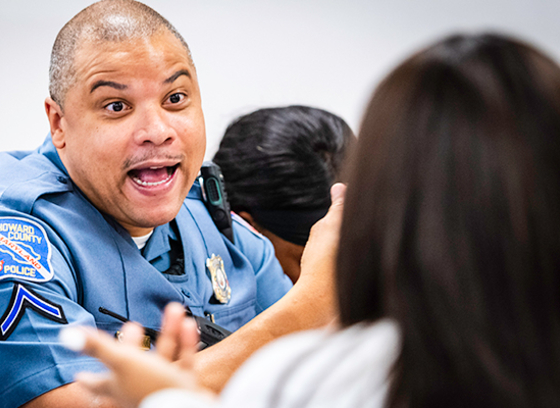About
The goal of the School Resource Officer (SRO) program is to build positive relationships with students and staff while providing a safe school environment and deterrence to crime. SROs ensure protection of students and staff and provide positive support for students through mentoring.
In addition to improving security, carefully selected, well-trained SROs bridge gaps between youth and law enforcement, creating positive impressions that transcend the school environment. These officers also help at-risk youth change behaviors that might otherwise lead to involvement with the criminal justice system. An SRO is a school community’s resident expert on emergency planning and response. As such, an SRO aids in the creation and use of effective emergency plans.

The goal of the SRO program is to build positive relationships with students and staff while providing a safe school environment. SROs serve as mentors, coaches, teachers and volunteers to support students during and after school hours.
The SROs bridge gaps between youth and law enforcement, creating positive interactions and understanding that transcend the school environment. These officers focus on restorative justice and help at-risk youth change behaviors that might otherwise lead to involvement with the criminal justice system. The SROs also oversee emergency planning and response at each of their respective schools.
Arrests and referrals are an absolute last resort in the schools and have been declining in numbers. Most disciplinary action is handled administratively by the schools. More than 80 percent of arrests are non-custodial, meaning students are not handcuffed or taken into custody. Instead, most are simply released to a guardian with a referral to appear at a later time.
Students who threaten to harm themselves, or express a desire to hurt others, may be taken to the hospital for mental health intervention and evaluation, known as an “Emergency Petition” (EP). This process is used throughout the state for people in crisis and is NOT an arrest. In an EP, the person is handcuffed for their own safety and the safety of those around them for transport to the hospital. While an EP may look like an “in-custody” arrest, it is actually a non-punitive action intended to protect the student in a potentially dangerous situation.
The HCPD offers a juvenile diversion program in which referrals are made to community-based support services to divert eligible juvenile cases from the criminal court system into remedial interventions to assist families in developing appropriate coping strategies.
The program includes Teen Court, which focuses on restorative justice and keeps young people out of the judicial system. Instead, first-time misdemeanor offenders can be diverted to Teen Court to face a jury of their peers. The teen jurors hear cases and render dispositions. The juveniles stay out of the traditional court system and have the opportunity to move forward without a criminal charge on their record.
In most incidents, an SRO is called by an administrator, teacher or other staff member to assist. In cases of last resort that result in arrest, most are incidents of violent behavior, usually attacks on other students. SROs also address drug dealing and possession in the schools, and disorderly conduct to a degree that disrupts school activities.
The SROs oversee many youth programs outside of school hours, including:
- P.L.E.D.G.E Leadership Camp
- Community Athletic Program (C.A.P.) mobile summer program
- BearTrax Program, including a week-long camp in August for incoming 6th graders
- Diversion Program
- Teen Court
- Field trips to baseball games, zip lining, snow tubing and other group activities
- Youth Police Academy
- Explorer Post Program
- Police Cadet Program
- Youth Advisory Council
Of the 13 SROs assigned to schools in Howard County, many of them serve as coaches and mentors in various youth programs. Many also sponsor basketball tournaments at their assigned schools, participate in after-school programs and take on various volunteer opportunities.
SROs also participate in classroom instruction. They help teach classes on a range of topics, including bullying, juvenile and adult law, constitutional law, search and seizure rights, and police-community relations. They also cover drug/alcohol abuse, mental health and suicide prevention, internet safety, vaping dangers, sexual/physical abuse, child exploitation and driver safety.
There are no costs unique to the officers in the SRO program that aren’t incurred for all officers in any other assignments, i.e. salary and standard equipment. If the SRO program were to be discontinued, there would be zero cost savings to the county or HCPSS. The current officers would remain employed by the HCPD and would be transferred to other assignments, freeing up $0 in funding.
Complaints against SROs are extremely rare. There were zero in 2018, two in 2019 (both investigated though witnesses, video and other evidence, and not sustained), and zero in 2020.
SROs receive specialized training through the Maryland Center for School Safety and the National Association of School Resource Officers, in addition to the extensive training all HCPD officers receive, which far exceeds the state requirements.